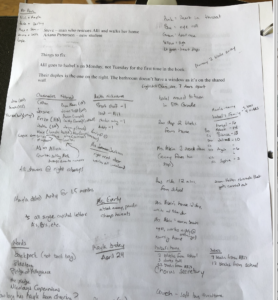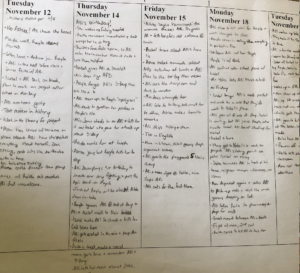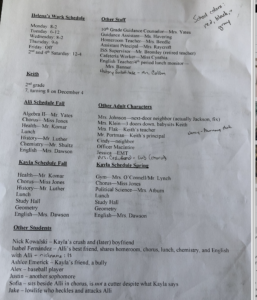I was recently talking to Brittany Stonestreet, a friend who is finishing up her Masters in Publishing at the prestigious Emerson College in Boston. She mentioned she was just completing the style sheet for her newest YA novel. I know editors always create a style sheet for a book they edit but I had not heard of writers doing this. I asked Brittany a number of questions. Here are her answers:
What do you include in your style sheet?
- character schedules (all main characters—school, work, etc.)
- all character names (minor, mentioned once, major, etc)
- character connections (how does the MC know this other character?)
- any detail (no matter how minor) that’s attached to a character or location
- distances to different places
- chosen spellings for words (if there are variants in dictionary)
Why is it important to keep track of all that?
- if you share a detail at one part of a manuscript (neighbor X leaves for work at 4:30 on weeknights) then it better remain that way for the entire book. (X wouldn’t be at the house at 5pm to help with an emergency situation.)
- consistency is key (MC wouldn’t walk 2 blocks to the pharmacy one day, then 4 the next time)
- changes in schedule can happen, but they need to be purposeful
- all names because you don’t want to repeat names (even with variant spelling). Same names happen in real life, but when people are reading a book, you don’t want to confuse them (e.g., Brian and Bryan)
- without a style sheet, a character’s name may change throughout the book (e.g., a character started with the last name Jackson, I accidentally switched to Johnson, then remembered at the end and switched it back)

I like that Brittany uses a day by day sheet as well to keep from making mistakes in the order of events of the book. This solves one of the most common errors we make when we write.
Will a style sheet help the eventual editor?
- If you know what you want in your book, have a style sheet. Pass this on to your editor. Then, as they are editing the book, they won’t need to email you for every detail (Is the pharmacy 2 blogs or 4 from her house?) because you’ve already solidly decided that.
- If you’re self-editing, you’ll most likely realize more details as you edit that you didn’t add to the style sheet. Things you didn’t think were important until you run into a snag in your own writing. Then you can add it (like I did) and later type it up.
- I always suggest typing it up! I didn’t used to. I would hand write it all out. And then promptly lose the notebook or paper it was written in/on. Yeah… not helpful when editing or writing.

I’m sold. I can imagine how many hours it would save as you work through the drafts. And consider how many hours it would save your editor and you, as you won’t have to deal with so many style queries. This was an example of a fiction style sheet but it would be every bit as helpful with your nonfiction book.
What do you think?

 AI Update: Good Enough
AI Update: Good Enough
Of course I have a style sheet
for every single thing I write,
and the first condition I must meet
is that my stonewashed jeans are tight
and my hand-tooled gator belt
is centered square upon my waist,
since most of my life I’ve felt
that success is grown from taste,
and thus it is each day I care
to put on the sequined shirt
and shake my soft and bouncy hair
out, because it cannot hurt
to set my lessers’ teeth a-gnashin’
in awe of my command of fashion.
You made me smile, Andrew. This early in the morning, it’s quite an accomplishment.
Thank you for the suggestion, Wendy. I write nonfiction, and I think I need a style sheet to keep track of verb tenses, when I use upper case (he/him or He/Him for God), formatting choices (what’s in quotes, italics, bold), how I set up bullet points . . . and stuff I can’t think of at the moment but will come back to haunt me later.
I recently line edited a friend’s manuscript, and I was grateful for the style sheet she included. Just down to the simple instructions like: Use a capital after colon when what follows is a complete sentence. Or “Use a comma before ‘then’ when used as a conjunction.” It helped me to know her style. Because many grammar issues are opinionated–this way or that, and both might be fine–but being consistent throughout the manuscript with that choice is what seems to matter.
Oooh, this is great Wendy!
I have assigned jobs for my character’s parents in one book and then forgotten in the other. I had to go back and hunt the info down before starting a new book with those characters. It would be great to do that ahead of time!